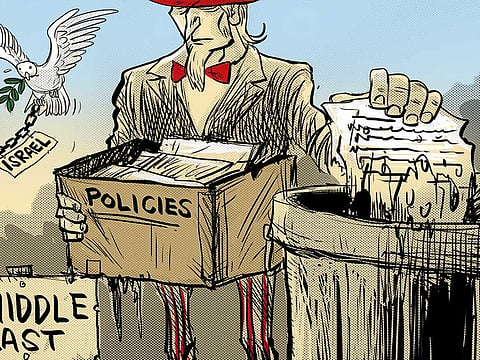Trump’s real test will be in ending Israeli occupation
If America is to become a true partner of the peoples of this region then it must abandon the policies that have fomented hatred, radicalism and despair

Following his historic visit to the region, United States President Donald Trump has managed to surprise his critics back home by sticking to the script, avoiding gaffes and leaving his hosts happy and content; each believing that he has secured something from the unconventional leader. For Trump, his maiden foreign trip was a resounding success. He has secured billions of dollars in deals for America’s economy, fulfilling a key election promise to create jobs at home, and in return he has assured America’s Arab allies that the US is reclaiming its traditional role in this part of the world, both as defender and key partner.
By resetting America’s relations with key regional players, Trump has done what seemed unthinkable even a few months ago, promoting a message of openness, tolerance and respect of Islam and the Muslim world. Gone is the Islamophobic election rhetoric, replaced by a more sober and responsible distinction between “Islamist extremism” and “radical Islamic terrorism”.
Moreover, Trump promoted a two-pronged regional approach that would evolve into his own Middle Eastern doctrine. He has established a link between the two main common enemies; Daesh and its proxies, and a terrorist Iran with its dubious regional agenda. In his own words, the goal was “to conquer extremism and vanquish the forces of terrorism”. His audience, Arab and Muslim leaders gathering in Riyadh, applauded him and unveiled a Middle Eastern Strategic Alliance of a more than 30,000 fighting force. Before calling on Muslims to drive out terrorists and extremists he summed up the choices that we face in our region: “But the nations of the Middle East cannot wait for American power to crush this enemy for them. The nations of the Middle East will have to decide what kind of future they want for themselves, for their countries, and for their children. It is a choice between two futures — and it is a choice America CANNOT make for you.”
Roots of regional instability
It was a strong message from the US president, but while it underlined the grim reality that we face today, it also failed to assume a fair share of responsibility for the dramatic rise of extremism in this part of the world as a result of disastrous US actions and policies over the past few decades. In his speech, Trump mentioned peace between Israel and the Palestinian once and in passing. He failed to underline that the roots of regional instability in this region are buried deep in the toxic soil of Israel’s 50-year occupation of Palestinian Territories. He avoided mentioning the catastrophic outcome of America’s invasion and occupation of Iraq in 2003, which unleashed waves of religious extremism and allowed Iran to impose its sectarian agenda in Iraq and Syria.
In truth, the people of the region will not hesitate to make a choice for the future. Who does not want peace and prosperity for themselves and the future generations? Who does not want extremism and terrorism to be rooted out from society and replaced by a culture of moderation, tolerance and peaceful coexistence? Who would want to see the systematic destruction of the ancient cultures of Iraq, Syria and Yemen and the horrific human toll that has wiped out entire generations?
Tough challenge
If America is to become a true partner of the peoples of this region then it must abandon the policies that have fomented hatred, radicalism and despair. That is not an easy task. Former US president Barack Obama promised to open a new chapter with the Arab and Muslim worlds in his famous Cairo speech in 2009. But he was unable to deliver. A good starting point would have been to address the historic injustice that has befallen the Palestinian people for almost a century. Obama tried and failed.
It is not the words and certainly not the expressions of goodwill by Trump that matter, but his actions. A joint effort to crush Daesh (the self-proclaimed Islamic State of Iraq and the Levant) and other militant groups is a priority. Building a united front to stop Iran’s malicious actions in Iraq, Syria and Yemen is needed. And yes, it is the responsibility of countries in the region to build open and tolerant societies, to invest in education and infrastructure, to instil democratic values and empower women, to listen to the youth and provide them with hope. But unless the common cause of the people of this region is settled justly, the Palestinian issue will continue to be the great interrupter.
Trump has promised to make a historic deal possible. He will soon be tested and we will see if the US can finally assume a high moral ground and facilitate an honourable deal that ends the occupation and gives Palestinians their freedom, or will it bend under Israeli pressure and claim indifference, thereby leaving the root cause of extremism and instability in this region to fester?
Osama Al Sharif is a journalist and political commentator based in Amman.



